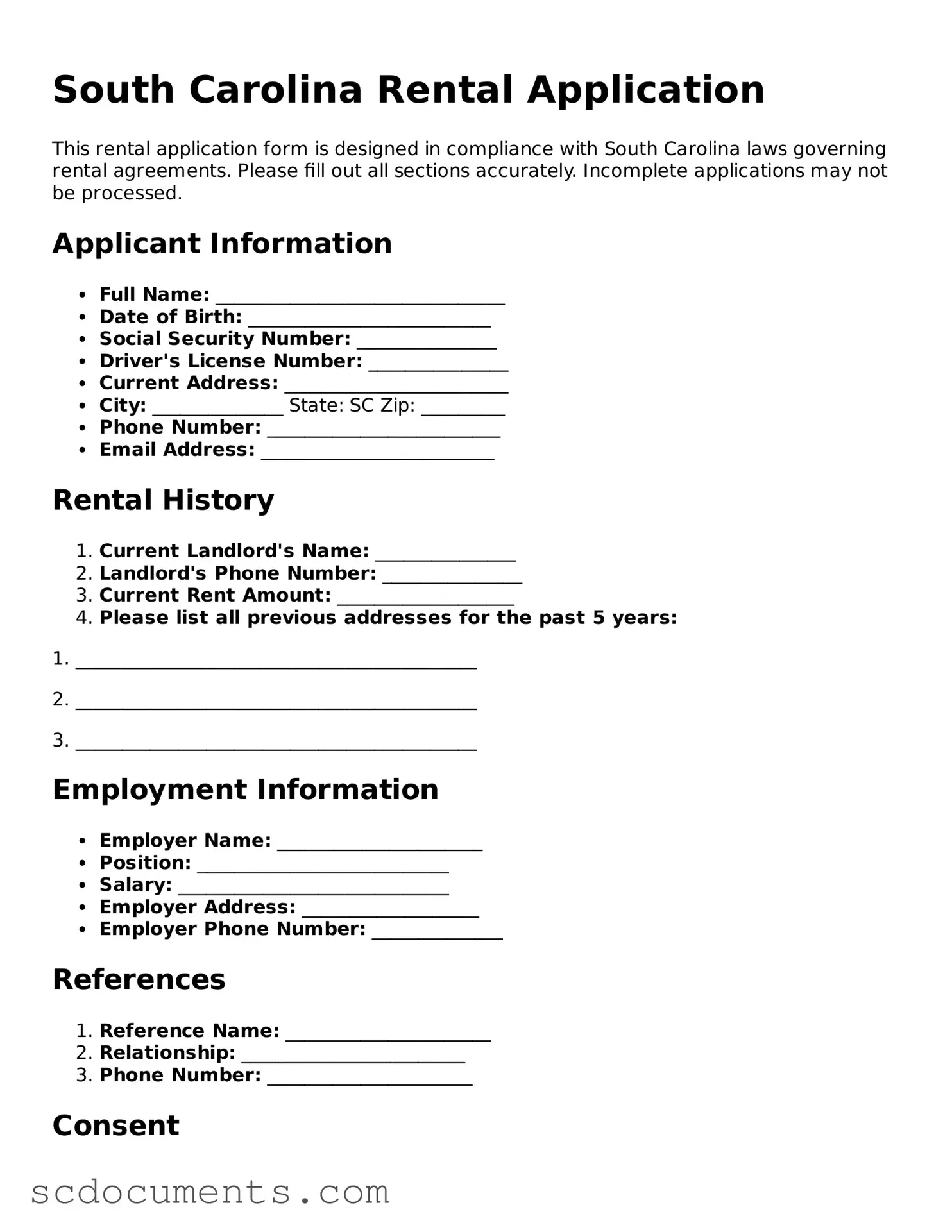Legal South Carolina Rental Application Form
Dos and Don'ts
When filling out the South Carolina Rental Application form, it's essential to approach the process thoughtfully. Here are seven key things to keep in mind:
- Do provide accurate information. Ensure that all details about your income, employment, and rental history are truthful. This builds trust with potential landlords.
- Don’t leave blank spaces. Fill out every section completely. Incomplete applications may lead to delays or disqualification.
- Do include references. Providing references from previous landlords or employers can strengthen your application.
- Don’t forget to proofread. Check for typos or errors. A well-presented application reflects your attention to detail.
- Do be prepared to pay an application fee. Many landlords require a fee to process your application, so be ready with the necessary funds.
- Don’t provide unnecessary personal information. Avoid sharing sensitive details, such as your Social Security number, unless specifically requested.
- Do follow up. After submitting your application, consider reaching out to the landlord or property manager to express your continued interest.
By adhering to these guidelines, you can enhance your chances of securing the rental you desire. Good luck!
File Data
| Fact Name | Description |
|---|---|
| Purpose | The South Carolina Rental Application form is used by landlords to screen potential tenants and gather essential information for rental agreements. |
| Required Information | The form typically requests personal details, rental history, employment information, and references from the applicant. |
| Application Fee | Landlords may charge an application fee, which is generally non-refundable and covers the cost of background checks. |
| Fair Housing Compliance | Landlords must comply with the Fair Housing Act, ensuring that the application process does not discriminate based on protected characteristics. |
| Governing Laws | The South Carolina Residential Landlord and Tenant Act governs rental applications and tenant rights in the state. |
| Privacy Considerations | Landlords are required to handle applicants' personal information with care and protect it from unauthorized access. |
Documents used along the form
When applying for a rental property in South Carolina, several documents are typically required alongside the South Carolina Rental Application form. These documents help landlords assess the suitability of potential tenants and ensure a smooth rental process. Below is a list of commonly used forms and documents.
- Credit Report Authorization: This form allows landlords to obtain a credit report on the applicant. It provides insight into the applicant's credit history, including outstanding debts and payment patterns.
- Background Check Consent: This document grants permission for landlords to conduct a background check. It often includes criminal history and eviction records, which are crucial for evaluating tenant reliability.
- Durable Power of Attorney Form: For individuals needing to designate decision-makers in critical situations, the important Durable Power of Attorney document template ensures that your preferences are honored.
- Proof of Income: Applicants typically need to submit recent pay stubs, bank statements, or tax returns. This documentation verifies that the applicant has a stable income sufficient to cover rent payments.
- Rental History Verification: This form includes information about previous rentals, such as landlord contact details and rental duration. It helps landlords assess the applicant's past behavior as a tenant.
- Pet Policy Agreement: If applicable, this document outlines the rules and fees related to having pets in the rental property. It clarifies any restrictions and ensures both parties understand the pet-related terms.
- Identification Documents: Applicants are often required to provide a government-issued ID, such as a driver's license or passport. This helps verify the applicant's identity and residency status.
- Lease Agreement: Once approved, this legally binding contract outlines the terms of the rental arrangement, including rent amount, lease duration, and responsibilities of both the landlord and tenant.
Gathering these documents can streamline the application process, making it easier for both landlords and tenants. Being prepared with the necessary paperwork can lead to a quicker approval and a successful rental experience.
Key takeaways
When filling out the South Carolina Rental Application form, there are several important points to keep in mind to ensure a smooth process. Here are five key takeaways:
- Provide Accurate Information: Ensure that all personal details, including your name, contact information, and employment history, are accurate. Inaccuracies can delay the application process or lead to denial.
- Include References: Many landlords request references from previous landlords or employers. Having reliable references ready can strengthen your application and demonstrate your credibility as a tenant.
- Understand the Fees: Be aware that some landlords may charge an application fee to cover background checks. This fee is typically non-refundable, so clarify the amount before submitting your application.
- Review Lease Terms: Before signing any lease agreement, carefully review the terms and conditions. Make sure you understand your rights and responsibilities as a tenant.
- Follow Up: After submitting your application, it’s wise to follow up with the landlord or property manager. This shows your interest and can help you stay informed about the status of your application.
By keeping these takeaways in mind, you can navigate the rental application process more effectively and increase your chances of securing your desired rental property in South Carolina.
Other South Carolina Templates
Durable Power Printable Power of Attorney Form - A Durable Power of Attorney can help prevent misunderstandings among family members.
The IRS W-9 form is an essential document used to provide taxpayer information to individuals and businesses. This form helps ensure accurate tax reporting and can facilitate proper payments for freelance work, contracts, and other financial interests. Understanding the W-9 is crucial for compliant and efficient financial transactions, and you can find more information at https://freebusinessforms.org/.
How to Do a Promissory Note - A promissory note protects the interests of both the borrower and the lender.
